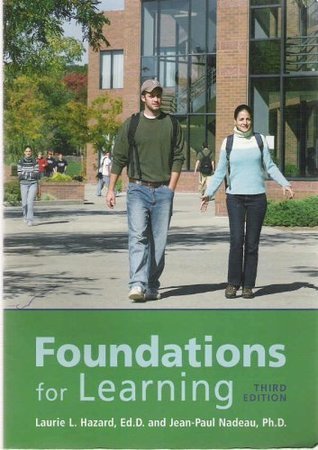What do you think?
Rate this book


The focus of Foundations for Learning is on academic adjustment with personal development issues seamlessly integrated into the academic emphasis theme of 'claiming an education' and taking responsibility for one's own education. It addresses both the attitudinal variables and personality traits that affect college achievement like locus of control, conceptions of intelligence, and intellectual curiosity in relation to specific study-related behaviors such as text annotation and active listening. At its core, this text is based on the psychology of adjustment. Students are pushed to consider how each mindset, perception, and attitude connects with their skill sets, and how one influences the other. It offers an acute awareness of first-year student needs, an intellectual approach, and a tight framework.
New to this edition:
Broadened audience - Now includes examples and student narratives originating in four-year institutions as well as two-year colleges, commuters, and adult learners. (In each chapter). Adjust Your Mindset and Adjust Your Strategies sections - serves to emphasize the distinction between attitudes and behaviors, which helps students consider their own evolving position. (In every chapter). New Sections/emphases - The “Planning, Prioritizing, and Procrastination” and “Developing Malleable Mindsets and Metacognitive Skills” chapters have undergone extensive revision. (Chapters 4, 5). Attention to emerging technologies - Addresses the influences of technology that educators are increasingly aware of such as course management systems (ie. - Blackboard, Desire to Learn, etc.), Facebook, Twitter, and texting is having on student learning. (Chapter 2). Expansion of Diversity Chapter - The “Reconceiving Diversity” chapter has been expanded to include an a more in-depth exploration of the sociocultural and sociopolitical views of diversity. (Chapter 3). First Year Diaries: Adjustment Reflections - journal entry “chunks” from actual students enrolled in a first-year experience course link readers to key chapter concepts. (In each chapter). Additional visual aids - These include a sample syllabus, a breakdown of variations of the 8-8-8 formula, and a graphic representation of Freud’s theory of personality, among others to reinforce difficult concepts. (In each chapter).For more information about the book including its’ support package, go to www.pearsonhighered.com/studentsuccess
MyStudentSuccessLab
Succeed in college and beyond!
Connect, practice, and personalize with MyStudentSuccessLab.
www.mystudentsuccesslab.com
Students connect, practice, and personalize skills through a
self-guided online solution with MyStudentSuccessLab.
Features peer-led videos, interactive exercises and projects, journaling and goal setting activities.
Provides academic, life, and career skills that will transfer to ANY course.
Connect with real students • Practice skill development • Personalize what is learned
To learn more about MyStudentSuccessLab, visit www.mystudentsuccesslab.com
147 pages, Paperback
First published June 1, 2005